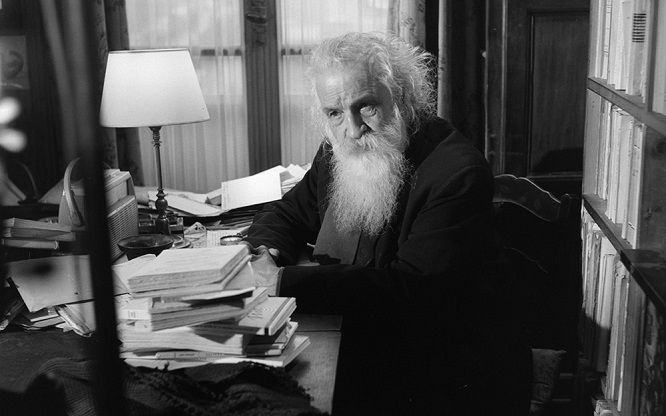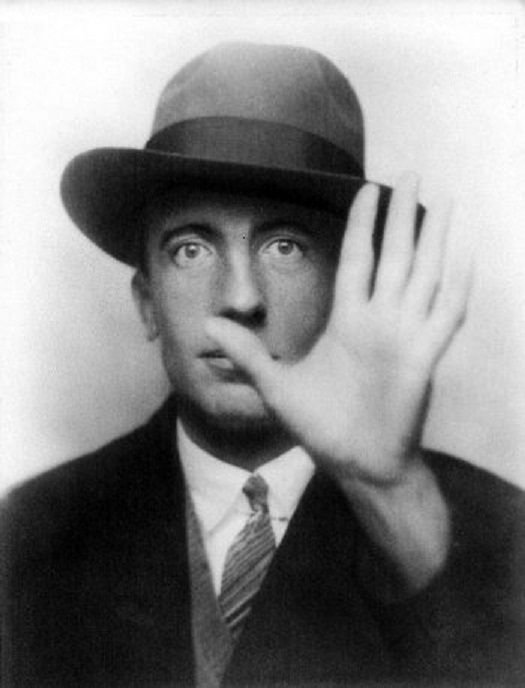Paul Éluard trough the eyes of Gaston Bachelard
In the sixties of the last century, important changes took place in French literary criticism. The composition of Roland Bart's "Zero Grade of Handwriting" formulates the principles of structural reading of the literary text. The idea is based on the following: By sticking only within the text and neglecting anything related to the writer's age or biography, the critic penetrates something more significant and essential in the work hidden from the viewpoint of the traditionally trained researcher. The school of so-called "new criticism" is being formed, which rejects the historiography in the literary analysis. In the school itself, two main strands emerged. One is related to intuitive interpretations of art; it seeks to reveal the key themes, images and metaphors in the text and elevates them to essential symbols of being. The other direction in the "new critique" is structural: it deals with a strict description of the artistic system of the work, of all its internal elements and ratios, and this, according to its representatives, is enough to understand the literary phenomenon.

Thus, to the unimaginable chaos of causal links in a work, the French "new critique" opposed a harmonious system of metaphors and signs. The creation of this system was particularly contributed by Sorbona Professor Gaston Bachelard, who lived from 1884 to 1962. A major impetus in his theoretical quests gives the rift with all of the present knowledge. Bachelard conducts a "second level" of science to overcome the unthinkable reflection of the world caused by reason and feelings. The French thinker assumes that such an entirely adequate form is the archetypes of the subconscious notions that mankind has about the surrounding nature, and these are: the paternal flagship properties of the Fire, the feminine tenderness of the Water, the maternal origin of the Earth, the free element of the Air. In defining the archetypes of human consciousness, Gaston Bachelard follows Karl-Gustav Jung's "analytical psychology" but creates his system of literary analysis. According to Bachelard, the sources of poetic imagination must be sought in the "store of the porcupines", which is revealed to our eyes during the celebration or in moments of enlightenment. For the French philosopher, crying as a change of education, but also as a method of deeper knowledge, is not covered with sleep. The dream provokes disharmony in the soul, and true blinding helps the soul to gain inner peace, to enjoy the harmless harmony. The sleeping person does not know that he is asleep, but the dreamer knows he is dreaming, and he focuses entirely on the object he wants to know. "I think, therefore, I am," the rationalist Descartes once said. "I love, therefore, I am" offers Bardar, the Irisharian, today. In his view, the intuitive LIFE in things is more valuable and more true than knowledge gained through experience. "A little poem is able to reveal to us the spectacle of the universe, the mystery of the soul, the subject, and all the objects at once," Bachelard wrote in his book, The Poetics of Bellows.
From this position, the French literary critic examines the work of Paul Éluard. The Fetus and the Mind - these are the two poles that determine the immortality of the poet, we read in his essay. Through the seed he is revived, through reason - he lives. A poem, imbued with immediate and genuine sincerity, is the germ of a new world, but it carries wisdom in itself: through it it crystallizes everything human. "Just one spark," William Blake said, "and here he is." The sparkle in Paul Éluard is even stronger, it burns even the hell, burns the old debris from the human heart, breaks down the flame-deterring slag. Spark is the germ of fire, it is the heart of human love. Read the poems of Éluard, take a piece of the fire that flashes in them, and you will know where the light comes from, Gaston Bachelard exclaims. And it goes on: in Éluard the images germinate well, grow up straight; in Éluard, the images are right: they have the sure and genuine reason that is transmitted from person to person, when the human space is purified by a healthy and pure simplicity.
Paul Eluard - Obsession
After years of wisdom
During which the world was transparent as a needle
Was it cooing about something else?
After having vied with returned favours squandered treasure
More than a red lip with a red tip
And more than a white leg with a white foot
Where then do we think we are?

The poet orders all natural forces to come out of the earth, overcome the chaos and look at the sun. As life wants light, so every creature wants to see - the embryo seeks reason, says Bachelard. Thus, the poet strengthens our starting point, the subject who understands the world by contemplating it directly. There are many clear, insightful, illuminating glances in the poems of Éluard. The desire to see, to make the other see - is the direct impact of the poet. With his fiery eye, the poet transforms the world. The world is no longer so promiscuous as the poet has touched him; the world is no longer so heavy as the poet has moved him; the world is no longer so tightly chained as the poet has discovered man's freedom in fields, forests and gardens; the world is no longer so hostile as the poet has made man realize his valor. Finally, Gaston Bachelard connects Éluard 's poetry with his theory of pigs and the deep exploration of the world. Reflections on a poem by Éluard reveal the power of the new incarnation of the imagination. To create an image means to really cry, "Here, look!" What has not been well-seen, which has sank into the lee of everyday closeness, is now a new object for a new look. The view, illuminated by Eliot's clarity, charms the unnecessary past, sees the immediate future and the beauty of the images. The poet discovers the beauty of vague images. This is part of the human destiny found and revealed to us by the poet. And let's use a dear to Baudelaire expression: "The poet helps us find the fateful forces." You would argue that it is not much merit to find the future in a beautiful, happy, cheerful image. But the forces of the future are conspiratorial. Sow in the heart of man the splendor of happiness, cast a single spark of hope, and then a new fire, directed, reasonable, fires in his life. Paul Éluard has said the poet is the one who inspires. Yes, but his beneficial influence is not limited to this: by discovering inspirational horizons, the poet gives us the dynamics of awakening. There is not a single verse in the whole work of Paul Éluard who can not squeeze the reader from the swamp, not the despair, the stagnant waters of indifference, the flat uniformity of selfishness. To read Éluard means to desire in you to penetrate the uplifting human poetic inspiration to love things, both life and people.
Gaston Bachelard completes his observations of the work of Éluard with the idea that the poet lives in the consciousness of the people with a prayer that appears just in time to awaken them, to revive them, to give them their living mind and heart, life , which is stronger because it begins again, young and powerful, purified by the fire. The myth of the Phoenix bird is a myth of the revival, the dialectics of life and death, the victory of anguish and despair, the destruction, and the destruction. Bachelard notes that Éluard's poetry brings together everything new and viable. The permanently established and eternally mobile here are not in contradiction. The Fetus and the Mind cooperate. In their absolute simplicity the images reach the beauty and the truth.
You got a 6.27% upvote from @postpromoter courtesy of @godflesh!
Want to promote your posts too? Check out the Steem Bot Tracker website for more info. If you would like to support the development of @postpromoter and the bot tracker please vote for @yabapmatt for witness!
To listen to the audio version of this article click on the play image.

Brought to you by @tts. If you find it useful please consider upvote this reply.